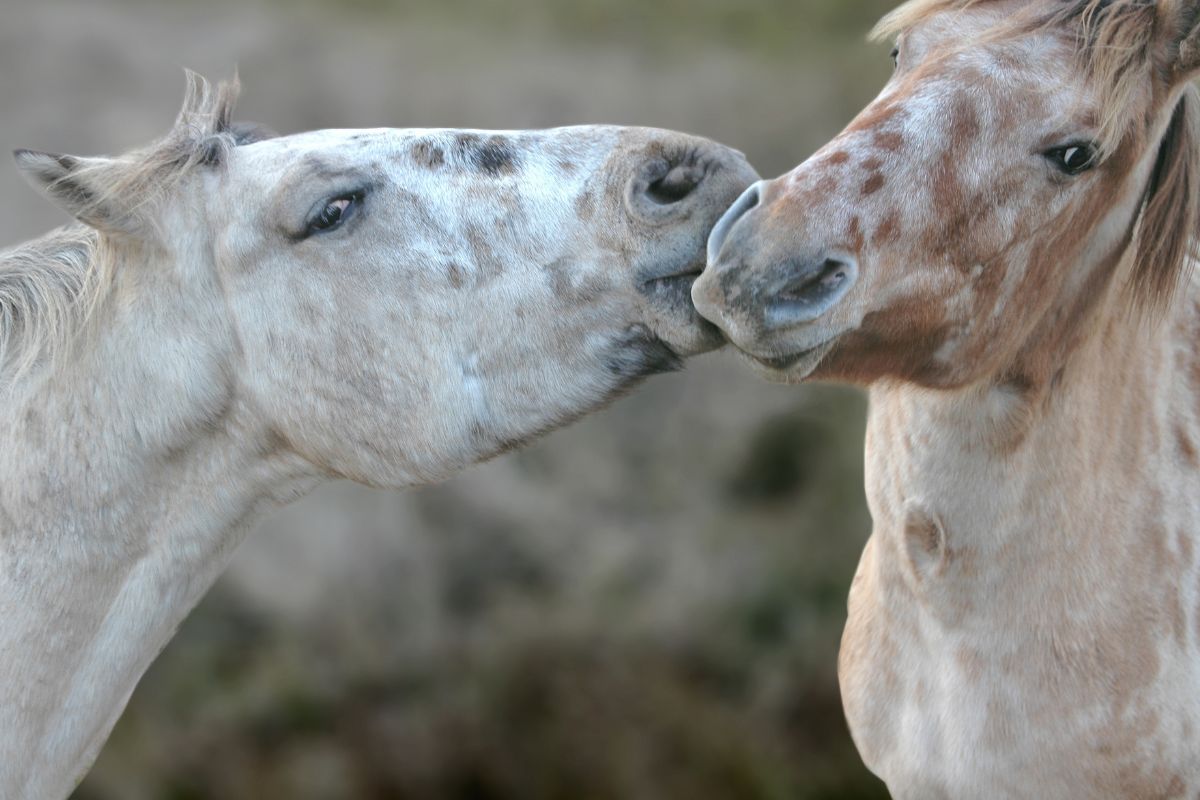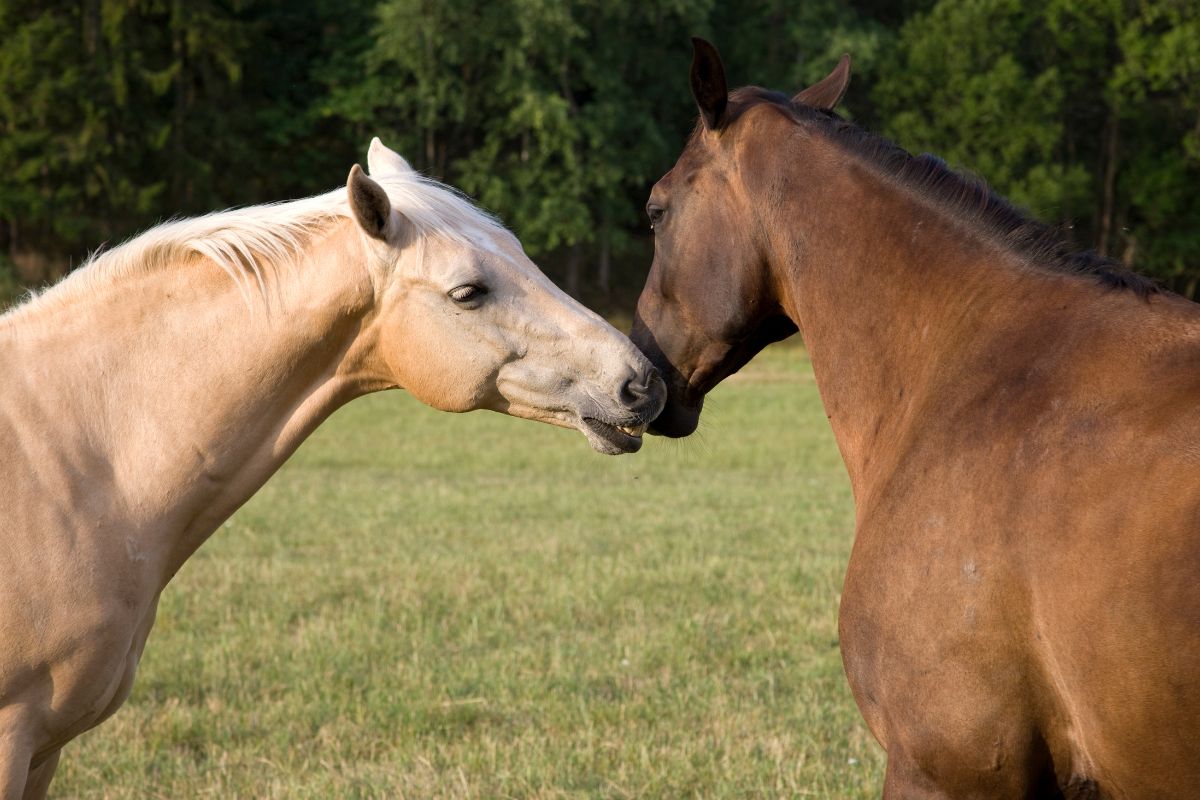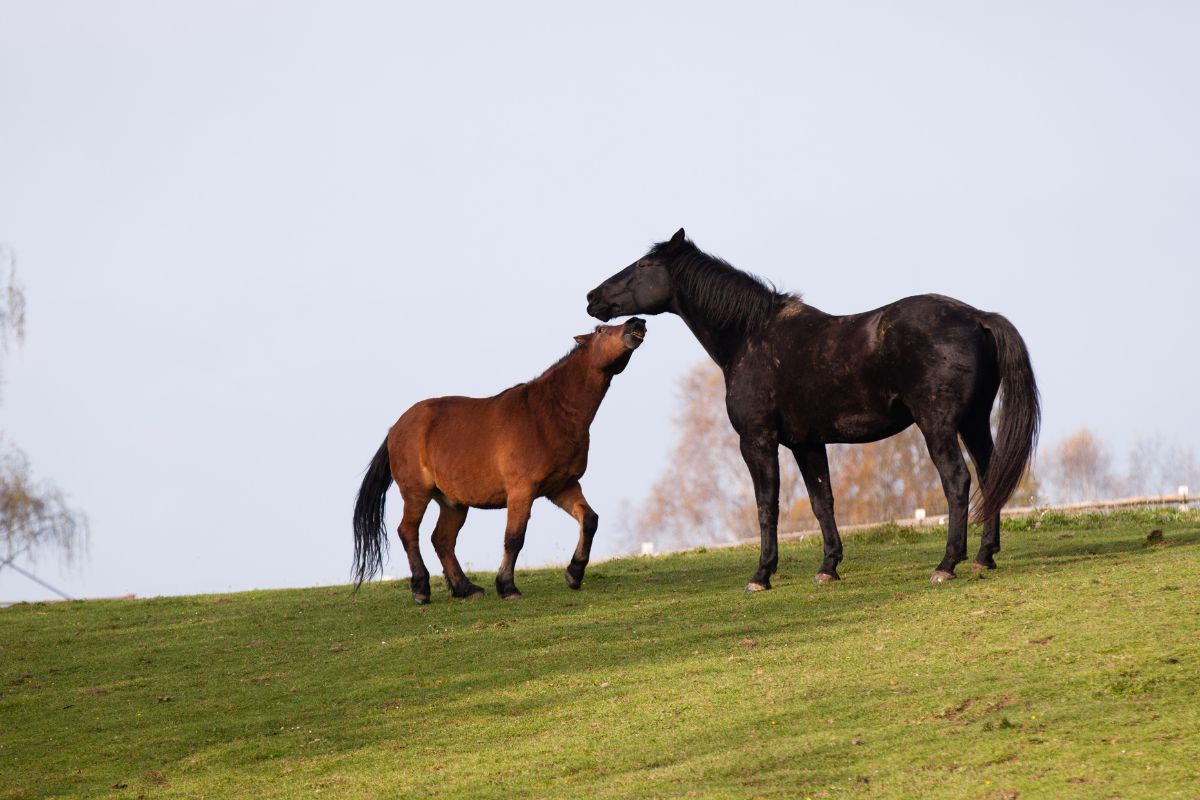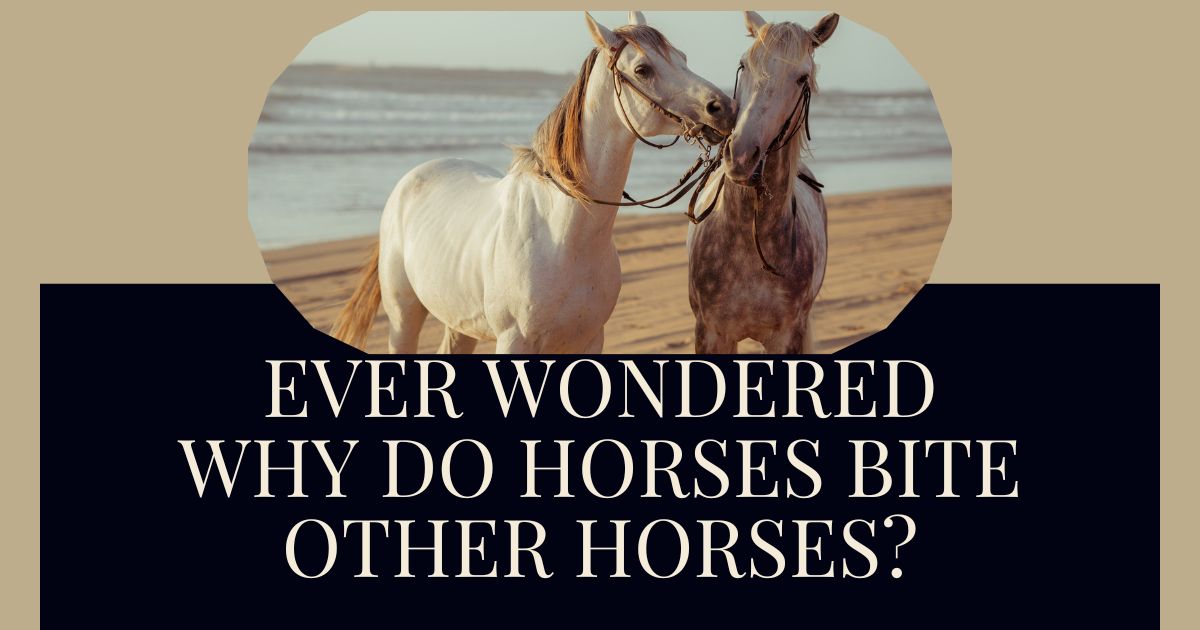Horses are incredible creatures until they bite. If you have ever wondered: “Why do horses bite other horses?” – it is finally time to discuss it.
Big and heavy, horses have mouths that are no less strong than the rest of their body. And when they bite other animals, it is difficult to understand the nature of such behavior.
This article attempts to answer some questions on why horses act the way they do and what responsibility horse owners have.

When Horses Bite Horses
There are numerous reasons why horses bite other horses. These animals have a wide range of emotions – anger, sadness, fear, joy, melancholy – so their behavior may sometimes seem confusing.
The presence of another animal or a human is critical for horses as they are herd animals.
So, when a horse bites other horses, it never stays meaningless. The horseman must watch their animal carefully to study their character.
Why Do Horses Bite Each Other?
The first thing to clarify – biting is natural for horses. As horses are herd animals, biting became necessary for survival and contact with other horses.
Horse teeth have multiple options. The animals use them to eat, scare off predators, fight for resources, groom other horses, or discipline younger horses. Horses also tend to study the environment through their teeth.
So, when the owner notices their horse biting other horses, it can mean lots of things. Let’s take a look at some of the common reasons why horses bite each other.
- Showing Affection
Affection is the most common reason for mutual biting between horses. The horses demonstrate affection and trust by gently nipping or pecking each other’s necks.
It’s normal as long as the other horse is not wriggling out. Still, it is important to watch the bites to avoid injuries in case one horse overdoes it.
- Allogrooming
Another answer to “Why do horses bite each other?” is allogrooming.
When horses groom each other, they tend to return the favor or show their pleasure by biting. The same also works with people.
A horse usually nips the top of its groomer’s neck and withers. The equestrian can scratch the bite place to relieve the sensation.
- Pair-bonding
Horses also share romantic affection towards each other. It usually happens during a grooming season.
Suppose two horses continuously nip or nudge each other while overlapping their necks. In that case, it is a sign the animals have established a strong bond.
- Asking to Move or Play
Sometimes a horse lends a gentle nip on the neck or withers to ask another horse to move. The horse will continue biting until the other horse moves.
However, it’s essential to be careful as horses can fight for dominance similarly. The horseman has to watch horses in a herd carefully.
Sometimes horses do not just seek dominance but are just bullies. So when one notices aggressive horse biting and hits the search bar with “Why my horse bullies other horses?”, it can signify a forceful dominance attempt.
- Protecting Itself
Biting can be a sign of fear as well. Like in the previous example, where biting reflected the bully’s side, the horse can be a victim. Not knowing other ways to display fear, they can turn to biting.
Aside from fear, horses tend to bite when sick or uncomfortable. Being unable to message their feelings due to their size and inflexibility, biting is the only way to gain attention.
- Exploring the World
Horses are curious animals. Ponies are especially interested in things around them, and teeth are – once again – one of a few options to explore the environment.
So when it comes to the question “do ponies bite?” the answer is yes.
However, foals tend to bite lightly, usually when playing. And rather than biting, ponies are more likely to nip. It applies to other horses and people who take care of them.
It is important to take such behavior under control because while it may seem like innocent play, biting can become a habit. And as the foal grows, it can start biting out of spoil.
How to Stop a Horse From Biting Another
It is possible to teach the horse to stop biting. After all, horse biting is a regular (although not good) thing. However, stopping this habit from childhood is crucial to prevent behavioral issues in adulthood.
Without further ado, here is the biting horse cure.
- Become the Leader in a Relationship
Horses are herd animals concerning the hierarchy. Dominance is an essential part of their social order.
Usually, horses demonstrate their dominance by controlling their peers’ movements. As one could already read, horse biting is an excellent way to do it.
Interestingly, horses determine hierarchy in their herd by observing the overall size of all mares. The biggest horse is usually the dominant one in the herd.
But what happens if another horse does not follow the order? Do horses fight?
The answer is yes. Fighting occurs when the mare challenges the biggest (or domineering) horse by not moving or reacting aggressively.
The horse owner has to understand all these nuances if they try to win the horse’s respect.
Generally speaking, one has to act like a leader in everything one does, so the horse learns to feel its owner’s dominance.
Notably, the horse bite comes as a gesture of disrespect. It also means the horse does not trust its owner.
To establish dominance, one can follow the next rules:
- Spend sufficient time with the horse. The owner’s presence should indicate interest and care;
- Keep the horse’s head at the front and center most of the time. If the horse turns its head in the wrong direction, the owner should gently push it back to the former position;
- The same applies to the rest of the body. If the horse does not stand where it has to, a gentle push to that spot will help her understand the instructions;
- Training of young horses has its nuances. The most important piece of advice is consistent orders. This way, a young mare will learn to follow orders from the beginning.
The tips above may be useful if the horse is violent.
- Training the Horse
An obvious yet essential piece of advice. Training is critical to make sure the horse acquires healthy behavior from an early age. Not only is exercise essential to fix the biting issue, but to prevent it from happening.
Young horses tend to nip their trainers as a sign of love. But as one remembers earlier, this cute habit can become a problem if the trainer does not establish rules from the beginning.
To train the horse to stop nipping, the trainer has to restrict the horse from grooming them. After all, it is typical for horses to return the favor. But the owner needs their horse to understand that grooming is a one-sided care act.
Pushing the horse’s head away also works, but one must remember gentleness.
- Teaching Respect to the Horse
Earning the horse’s respect has a few benefits. First, they follow the owner’s orders. Second, they trust them. And third, respect is a likely sign of a healthy relationship between the horse and its owner.
Notably, the horse will be afraid of its owner without genuine respect.
Being a leader includes a portion of respect. However, one must maintain it as it is a valuable asset in a relationship with the horse. If the horse loses respect for its owner for whatever reason, it can become violent (hence the horse biting).
Furthermore, by establishing respect, it is much easier to train the horse as the owner does not need to win recognition for each new command.
There are several rules on how to teach the horse respect:
- Separate the personal space and make the horse stay out of it unless there is an order;
- Move the horse’s shoulders away so they realize the owner’s space;
- Not feeding the horse with bare hands, as they may tempt the horse to bite;
- Punishment for bad behavior is necessary, but the owner has to ensure the horse has no health problem that caused such behavior;
- A soft pat on the shoulder or a snack is a vital reward policy. This way, the horse starts differentiating bad and good behavior.
- Exercising the Horse
One of the reasons for horse biting is excessive strength. It is the reason why aggressive behavior is prevalent among male horses. Like in previous situations, if the owner leaves such behavior untreated, the horse can become violent and misuse its power.
To prevent it, it is essential to keep the horse active every time they have an urge to bite.
Groundwork is great for helping the horse and the rider learn about each other, establish mutual understanding, and create a bond. Not to mention, it is valuable for building trust and discipline, all at the same time.
The trainer has to engage the horse in many activities to burn the excessive energy. In addition to the groundwork, one may consider horse racing or teaching new skills. This way, the horse will stay physically and mentally engaged while learning to follow the orders.
Feeding is another good stimulus. The owner can keep the horse busy by giving it snacks. Eventually, the animal has healthy energy sources while not letting it stall.
- Find a Good Vet and Trainer
Unfortunately, some cases are way too serious to handle alone. That said, the owner may need the help of vets or specialized trainers to treat horse biting.
The reasons for aggressive behavior are numerous and do not always mean attempts for dominance or disrespect.
In fact, it is not unusual for horses to bite if they have health problems, and biting may be the only way to signal it.
When such a thing happens, one should consider calling the vet. Some diseases can cause discomfort to the horse, so it is never a bad idea to check on the horse once or twice too often.
A trainer can help manage the bad behavior to prevent growing it into a severe issue.
But in the end, working with the vet and the trainer is even better, as it allows the owner to observe their horse better, understand their reactions, and decipher behavioral patterns.

What is Considered a Horse Bite?
Horse bites are not the most popular topic when talking about animals. Still, it is essential to consider that horses can cause real injury and infection if they bite too hard.
A regular horse’s jaw strength (masseter muscle) is around 500 psi (pounds per square inch), or 35.15 kg/cm2. Of course, it is the average number, yet it does not mean weaker horses are not dangerous.
For comparison, the strength of the human jaw is less than 200 psi (14.06 kg/cm2). In other words, if the horse bites, it bites severely and leaves the consequences to deal with.
Sometimes, aggressive horse biting means biting off a human finger or causing a similar injury if the owner does not manage the situation.
How Does a Horse Bite?
In short, horses use their muscles of mastication to bite. Due to the significant advantage in all physical parameters, horses have a much more complex musculature.
Muscles of mastication are key muscles for opening and closing the mouth while chewing and closing both jaws.
A horse can control the strength of its bite, which explains its gentle nipping when they try to get or show affection.
However, while gentle nibbles are safe for other horses and people, hard chomps can cause irreversible injuries.
Do Horses Bite People?
Horses tend to bite into and around everything their mouth can fit.
That said, if the owner does not start training in time, the horse is more likely to bite itself, other horses, inanimate objects, and people.
Horses can bite people for the very same reasons they bite other horses.
Commonly, horses bite humans as a sign of aggression. Other symptoms of hostile behavior include pinned back ears and stomping of the feet.
At the same time, horses can bite as a response to allogrooming and means of communication. As we mentioned before, horses can bite to show discomfort or agitation. In short, the reasons for horse biting are numerous, so the owner has to stay attentive and react to all suspicious signs.
What to do if a Horse Bites You
If the horse has bitten you eventually, the first thing you must feel is pain and confusion. However, among all that brain fog, it is essential to remember the horse did what it did without an actual desire to harm. Of course, unless your horse has already exhibited signs of aggression before.
The best way to manage the situation is to not be equally hurtful towards the horse via punishment. Quite the opposite – providing all the necessary training to burn excessive energy is the best strategy.
Next time the horse tries to bite you, use your elbow to stop its advance. Another tip is holding the horse’s head to your side or front. This way, blocking off nips with your elbow would be easier. At the same time, remember to stay gentle towards the horse.
Let us also suggest some practical activities to discourage the animal from biting. If you have a working trot or canter, applying them when the horse seems ready to bite you is a good idea. A couple of circles should help calm the horse down. Read our article and find out 8 of the Best CALMING Supplements for Horses.
The trick of giving physical activities is not only to burn energy but also to help horses associate bad behavior with more work. Eventually, they are less likely to bite when the association is strong.

Parting Words
Training a horse is difficult, so props to those who do it successfully.
The risk of horse biting will stay even with all the training. But the trick to minimizing it is to learn to listen to these animals, communicate with them, and become good friends.
One has to remember that horse bites are not always aggressive, so their reaction to them should be calm. After all, horses have no other means to communicate their feelings but teeth, and one just has to deal with it.
Hopefully, this article gave some answers to the most common questions about horses and how to stop a horse from biting.
